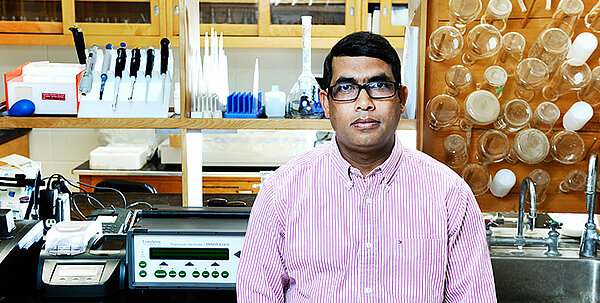
NDSU expert helps stop spread of avian influenza
Published May 11, 2015
Shafiqur Rahman knows little about avian influenza, but he knows as much as anyone in the country about the environmentally friendly and safe disposal of animals that have succumbed to disease.
When the North Dakota Animal Health Division needed to dispose of 130,000 turkeys from two farms in the state, the NDSU associate professor of agricultural and biosystems engineering got the call. It came in April when authorities confirmed the presence of avian flu on two turkey farms in the state.
Infected birds need to be humanely euthanized to stop its spread, but the virus doesn’t die with the animals; they need to be disposed of properly so the virus dies, as well. In many cases the best option is composting, but the compost piles need to be constructed in just the right way.
“If you’ve ever tried composting in your backyard, you know it’s not that easy,” said Lori Miller, senior staff officer and environmental engineer with the federal Animal and Plant Health Inspection Service. “Composting mortalities, especially during an emergency-response situation, definitely is not that easy. It’s more of an art than a science, and you need someone who knows what they’re doing.”

Shafiqur Rahman, an expert in environmentally friendly waste management, is helping officials dispose of poultry infected with avian influenza to ensure the virus does not spread.
Rahman knows. Throughout his career he’s been researching and creating best practices for limiting environmental impacts of livestock waste while getting more value out of what would otherwise be discarded or allowed to run off. His focus areas include air quality, water quality and greenhouse gas measurement and mitigation from livestock production facilities. Over the years, he’s also developed expertise in composting.
“This is crucial because if the virus continues to spread, it could seriously impact North Dakota’s poultry producers,” Rahman said. “The state and federal agencies contacted me because I have done composting before and published peer reviewed articles and Extension bulletins on the subject. Part of our mission is to use our expertise to help the citizens of North Dakota, and I’m happy to be able to help.”
Rahman worked with one of the country’s foremost experts in mortality composting on containing the virus on the first farm. When state and federal officials found the disease at a second operation, Rahman handled the entire composting process. That meant constructing 12 layered compost piles approximately 200 feet long, 15 feet wide and 10-15 feet tall. They needed to contain just the right mix of carbon, nitrogen and moisture. In addition, allow air needed to be able to flow through to expedite the composting process.
It’s important to get all those elements right to raise the temperature to at least 131 degrees Fahrenheit and maintain it for three to five days, Rahman explained. The combination of heat and time kills the virus. In addition, it’s important to keep the composting pile intact for several weeks to make sure that birds decompose.
Readings at the site in early May have shown the compost piles have nearly reached the required 131 F and the temperature was continuing to rise. Rahman expects to be back at the site in mid to late May with state and federal officials to do more testing and ensure the virus is gone and will not spread to other poultry farms. The compost will be safe to use as organic fertilizer.